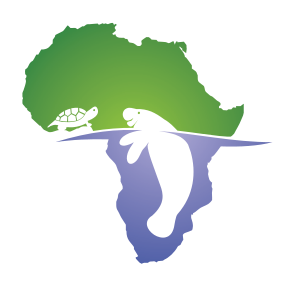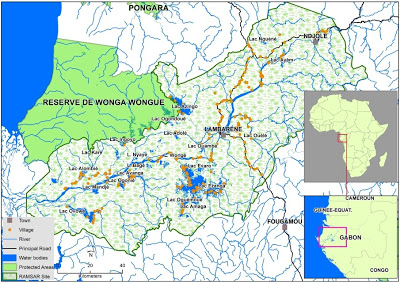With my Gabon research permit in hand and a week of meetings completed, I was finally ready to leave Libreville on 31 August. My Cameroonian colleagues Aristide and Rodrigue had flown in from Yaounde and met me in Libreville. I’ve written about Aristide before, he’s leading manatee research in Cameroon, starting the country’s first marine mammal stranding network, and training other Cameroonian students in manatee research techniques. He’s also currently in the running for a Fulbright scholarship to do his PhD in the USA, so all my fingers are crossed for him! Last year Aristide introduced me by email to Rodrigue, who is a Masters student in Cameroon now studying manatees at Lake Ossa, basically taking up where Aristide’s Masters project left off. Both guys are extremely motivated and enthusiastic, so I invited them to join me in Gabon for the manatee training workshop I’m leading; Aristide to help me lead the workshop, Rodrigue to participate, and for both to expand their manatee contact network in the region.
So on the 31stwe got a ride in a pickup truck from Libreville to Lambarene, a trip of about 5 hours into Gabon’s interior. The roads are now much better than I remember thanks to some newly paved areas, and the pickup with only 5 of us packed in with all of our luggage was still much better than the 15 passenger bush taxis that are the other way to travel here.
Lambarene sits at the edge of the largest river in Gabon, the Ogooue. Downstream from Lambarene are several very large lakes, lots of smaller ones and a quite a few villages, upstream are many tributaries, smaller lakes and fewer villages. Manatees are seen in this region throughout the year, but no one knows how many are in this population or if they migrate anywhere else. Lambarene is unfortunately the center of the bushmeat trade for Gabon, and manatees are seen in the markets here regularly, along with elephants, primates, crocodiles, and many other supposedly protected species. Enforcement of laws for wildlife is almost non-existent in this country that traditionally has lived on bushmeat and has almost no agriculture. Change is coming slowly; there have been some recent and well-publicized crackdowns on elephant poachers, thanks to new leadership in the national parks authority and the hard work of an NGO called Conservation Justice, but most hunters quickly pay their way out of jail and other species currently get little attention.
Map courtesy of Ramsar
I came to Lambarene because I want to train and inspire the local biologists here to start documenting manatees, both in the wild and in the market, so that we can begin to understand the Ogooue River population and have accurate data to pressure law enforcement to really crack down on the illegal hunting and sale of manatees in Gabon.


